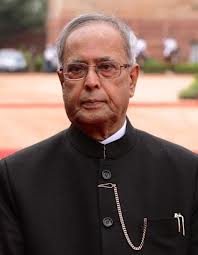"We have learnt the difficult way that unless there is peace at our borders, development and harmony cannot be achieved," he said while accepting an honorary degree from prestigious Istanbul University here yesterday, soon after arriving from Belgium.
The University honoured Mukherjee by conferring the 'Doctorate, Honoris Causa, in Political Science' for his achievements political life and contributions to governance and democracy in India.
"India and Turkey live in extremely difficult geographies, and both of us are aware of the grave challenges to our security, internal as well as external. However, I am sure you would agree that India's commitment to peace is unfailing. We continue to sustain moderation, pluralism and tolerance in our society," Mukherjee said.
Talking about commonality in India and Turkey's political structures, he said, "The success of our (India and Turkey) democratic institutions lies in responding to the challenges of our time and the hopes and aspirations of our people. They have to usher in the change and achieve the progress that we desire in our two countries."
Before leaving for the two-nation trip, Mukherjee had rejected Pakistan's contention that "non-state actors" were behind terror attacks in India, saying such elements were not coming from heaven but from territory under its control.
"...non-state actors, that is the phrase they used, then I responded by saying that non-state actors are not coming from heaven. Non-state actors are coming from territory under your (Pakistan's) control," he had told Euronews.
Mukherjee, who is on a three-day visit to Turkey, also emphasised on the absence of good governance as the root cause of many of the serious deficiencies in societies.
He identified good governance to be the essential, the most basic philosophy with the rule of law and justice being the most important tenets of good governance.
Mukherjee said, "It (absence of good governance) robs the citizenry of their security, and of their social and economic rights, ironically established for their welfare and collective good. Good governance is critically dependent on the existence of some fundamental pre-requisites."
"At the core is the inviolable adherence to rule of law and delivery of justice. From these principles would emanate the existence of participatory decision-making structure, transparency, responsiveness, accountability, equity and inclusiveness," said Mukherjee.
"This would particularly imply the existence of a corruption free society and the presence of adequate avenues especially for the marginalised sections to have a definitive role in decision-making. In brief, good governance means the existence of an elaborate architecture that has the good of the people as their only foci," he said.
Mukherjee, while talking about his vision of India in the year 2047, said, "I certainly hope that with all this, in 2047—after one hundred years of independence—my vision of an India fully transformed into a democratically mature, stable and peaceful nation with freedom and opportunity for all will become a reality. It will be an India that is economically prosperous at all levels of society."
He also said India is no longer defined by her problems but by her achievements and the opportunities it offers. However, achieving equitable economic growth is still a challenge.
While accepting the Doctorate, the President said, "While I am humbled by this honour, this recognition, in my view, is due to the Indian nation and its people. India is a developing economy. It has pursued a democratic model of governance to provide opportunity for the development of every individual.
"India's democracy is an inspiration to the forces of liberty around the world. When we started our journey of democracy in 1947, we were a new nation with a handful of challenges. We have overcome trials and tribulations and grown in strength to be a vibrant democracy today," he said.
Dwelling on democracy, the President India and Turkey share a deep commonality in respective political structures and the success of lies in the democratic institutions in responding to the challenges.
"They have to usher in the change and achieve the progress that we desire in our two countries. A key factor that can contribute to its achievement is Good Governance," he said.
"Good governance is critically dependent on the existence of some fundamental pre-requisites. At the core is the inviolable adherence to rule of law and delivery of justice. From these principles would emanate the existence of participatory decision-making structure, transparency, responsiveness, accountability, equity and inclusiveness," he said.






Comments
Add new comment